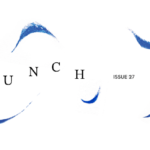Menu
Eggs by Vikram Ramakrishnan
Baba emptied the fishing net out onto the catamaran the same day he woke up from a yearlong slumber. That morning, his eyes burst open and he wheezed awake. We cheered, and when Baba asked where Ma was, it went quiet, but we told him. She was gone, she didn’t make it out alive.
The fish plopped out onto the wooden deck, flat at our feet like lead-filled stones. None of them wriggled like they used to. We’d been looking for healthy fish for all of that year, and it was always like this. We thought that since Baba was a real fisherman, he’d have the magic touch to catch real fish, edible ones that would flop around in glee.
He took a knife out, the serrated one with sharp teeth that fit like a short sword through his belt, and sliced a fish open. It bled a black tar, a slick oil that ran over his hands and dripped onto the wooden floor before he tossed the fish back into the water. He tried again, but they all gushed that black hopelessness we had felt for so long. So he did what you’d think a man like him would do. He had us throw all the fish back into the water and asked us what we’d been eating if the fish were always like this. We told him we still had pickled fish, and that lasts forever, and that we also had a couple spoons of ghee along with some raw ginger every day. Raw ginger? Baba said. That doesn’t sound too good, sounds like it would burn.
Baba pulled the catamaran back towards the shore and we all heaved it onto the docks. He scratched at his beard. We hadn’t cut it while he slept because we worried that if we did, it might hurt him in some way and he’d never wake up. I need to shave this off, he laughed.
When we got home we told him the birds and dogs and cows that we were taking care of were all dead. Baba wasn’t mad. He justsaid that they were there to help us grow, but we had grown up a lot faster on our own since the apocalypse anyways. He pointed at the pickled fish on his banana-leaf plate, and we smiled when he ate it and gave us a thumbs up.
Once he finished eating, we stood around the empty fishing net and thought about what we were going to do when the pickled fish ran out. Baba asked if we’d had any ideas while he was sleeping for a year. We all glanced at each other, eyes full of worry.
What about the fish eggs, I asked, and everyone’s heads swung to me.
We already talked about that, one of my brothers said, and we don’t know how to hatch them.
Baba said, Maybe we don’t need to know how to hatch them, just give them the space to figure out how to hatch on their own.
So we went back into the water and threw the net out again. And again, the fish fell like rocks onto the catamaran deck, and Babasaid, Let’s open them all up and take their eggs. The eggs were tiny orange spheres, like little oranges packed with sunlight. We collected as many as we could and filled up jars and jars of eggs and took all of them home.
To be honest, I thought we were going to eat them, and when I almost threw a jar down my throat, Baba said stop. Fish spend their entire lives in water, he said. They live in a medium that we’ll never know. But we can learn from them.
He collected all the jars into his arms and waddled over to the well. He put the jars in the bucket, lowered them into the water and brought the empty jars back up.
You don’t need to be in the same medium your whole life, he said.
And so we repeated this every day – collecting fish, slicing them open, taking their eggs, bringing them back home, sending them down into the well.
It was sunny the morning I woke up to cheers. When I ran outside, I saw Baba wrestling with an armful of fish as we all gathered around him. In the well, there were hundreds more of them splashing like the monsoon’s children, sunlight glinting off their reddish-pink scales.
Vikram Ramakrishnan is a Tamil-American writer who was born in Bangalore, India and grew up in Albuquerque, New Mexico. He is a graduate of the University of Pennsylva- nia, where he studied physics, mathematics, and computer science. His writing has appeared or is forthcoming in Newfound, Atlas and Alice, and AE: The Canadian Science Fiction Review. He lives in New York City.
Read more pieces from SAND 21.
KEEP ON READING
From Pantyhose for Daisy by Dewi de Nijs Bik tr. Emma Rault
Poetry | Issue 26: Shifting (translated
No Comments
No Comments
No Comments

